Anarcho-capitalist FAQ
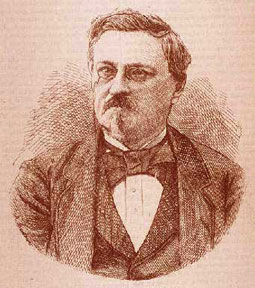
Gustave de Molinari (1819-1912))
seminal anarcho-capitalist
- What is anarcho-capitalism?
- Why should one consider anarcho-capitalism?
- Do anarcho-capitalists favor chaos?
- Isn't anarcho-capitalism utopian?
- Isn't laissez-faire capitalism exploitative?
- What justifications are there for anarcho-capitalism?
- Are anarcho-capitalists anti-war?
- What are the myths of statism?
- What are the myths of socialism?
- Why don't you just leave?
- Are there different types of anarcho-capitalism?
- How do anarcho-capitalists compare to other anarchists?
- Is anarcho-capitalism the same thing as libertarianism?
- Who are the major anarcho-capitalist thinkers?
- How would anarcho-capitalism work?
- How would anarcho-capitalists handle the "public goods" problem?
- Have there been any anarcho-capitalist societies?
- How might an anarcho-capitalist society be achieved?
- What is the anarcho-capitalist theory of property?
-
Where can I get more information about anarcho-capitalism
i.e.
books, web sites, videos, posters, memes, symbols, flags, and anarchist songs? - Do you have any tips on how to talk to people about anarcho-capitalism?
For information about anarchism in general (not just anarcho-capitalism) see The Anarchist FAQ, Bryan Caplan's Anarchist Theory FAQ, or the ebook Against Authority. Also see: anarchism and libertarian links.
1. What is anarcho-capitalism?
Anarcho-capitalism is the political philosophy and theory which asserts that
- the State is an unnecessary evil and should be abolished, and
- a free-market private property economic system is morally permissible
A typical dictionary definition[Onelook] of anarchism is:
The theory or doctrine that all forms of government are oppressive and undesirable and should be abolished. - American Heritage DictionaryThis definition follows the etymology of the word: "Anarchism" is derived from the Greek αναρχία meaning "without archon" (ruler, chief, or king.) This is the core meaning of the term - against the State. This means against it in principle, as an institution, not merely against certain policies or personnel.
Murray Rothbard coined the term "anarcho-capitalist" in the winter of 1949 or 1950.
My whole position was inconsistent ... there were only two logical possibilities: socialism, or anarchism. Since it was out of the question for me to become a socialist, I found myself pushed by the irresistible logic of the case, a private property anarchist, or, as I would later dub it, an anarcho-capitalist. - [Cf: MisesWiki: Rothbard]
Some prefer the term market anarchism to avoid the negative connotations associated with "capitalism," while others prefer private property anarchism or voluntaryism.
2. Why should one consider anarcho-capitalism?
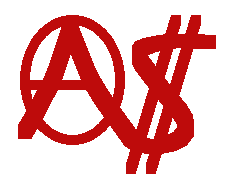
First, there is the issue of self-ownership, as the abolitionists called it, or moral autonomy as the philosophers call it. Is your life your own moral purpose? Do you deny you owe obedience to anyone except by consent? In natural rights language: Do you have rights - moral claims to freedom of action? If you answer yes to any of these questions, then logic leads you to the position of philosophical anarchism.
The defining mark of the state is authority, the right to rule. The primary obligation of man is autonomy, the refusal to be ruled. It would seem, then, that there can be no resolution of the conflict between the autonomy of the individual and the putative authority of the state. Insofar as a man fulfills his obligation to make himself the author of his decisions, he will resist the state's claim to have authority over him. That is to say, he will deny that he has a duty to obey the laws of this state simply because they are the laws. In that sense, it would seem that anarchism is the only political doctrine consistent with the virtue of autonomy. - Robert Paul Wolff, In Defense of Anarchism
A second more consequentialist reason is the dismal record of States. Considering all the war, genocide, slavery, and repression perpetrated by States through history, might humanity do better without this barbaric institution? As the young Edmund Burke wrote in the world's first anarchist essay (before he went conservative):
These Evils are not accidental. Whoever will take the pains to consider the Nature of Society, will find they result directly from its Constitution. For as Subordination, or in other Words, the Reciprocation of Tyranny, and Slavery, is requisite to support these Societies, the Interest, the Ambition, the Malice, or the Revenge, nay even the Whim and Caprice of one ruling Man among them, is enough to arm all the rest, without any private Views of their own, to the worst and blackest Purposes; and what is at once lamentable and ridiculous, these Wretches engage under those Banners with a Fury greater than if they were animated by Revenge for their own proper Wrongs. - A Vindication of Natural Society
That was written in 1756, long before modern weapons of mass destruction and long before 170 million civilian people were murdered by their own governments in the 20th century. That's just civilian deaths perpetrated by their own governments; it doesn't count the deaths due to enemy States, deaths of soldiers, dislocated refugees, and so on. To quote Rothbard, "If we look at the black record of mass murder, exploitation, and tyranny levied on society by governments over the ages, we need not be loath to abandon the Leviathan State and ... try freedom."
3. Do anarcho-capitalists favor chaos?
No. Anarcho-capitalists believe that a stateless society would be much more peaceful, harmonious, and prosperous than society under statism. We see life under States as chaotic - the insanity of war and the arbitrariness of government regulation and plunder. Anarcho-capitalists agree with the "father of anarchism" Pierre Proudhon: "Liberty is not the daughter but the mother of order," and his contemporary Frederic Bastiat, who wrote of the "natural harmony" of the market, that "natural and wise order that operates without our knowledge." - Economic Harmonies
4. Isn't anarcho-capitalism utopian?
No. Anarcho-capitalists tend to be pragmatic, and argue that, no matter how good or bad man is, he is better off in liberty. If men are good, then they need no rulers. If men are bad, then governments of men, composed of men, will also be bad - and probably worse, due to the State's amplification of coercive power. Most anarcho-capitalists think that some men are okay and some aren't; and there will always be some crime. We are not expecting any major change in human nature in that regard. Since utopianism by definition requires a change in human nature, anarcho-capitalism is not utopian.
5. Isn't laissez-faire capitalism exploitative?
No. Laissez-faire literally means "let us be!" It means absolutely no government intervention in the economy - a free market. Of course, this is an ideal. Certainly the statist quo is not laissez-faire capitalism! Even in so-called "capitalist" States (really mixed economies), the government engages in all sorts of intervention: taxation, regulation, protectionism, prohibitions, occupational licensure, monopolies on "command posts" of society.
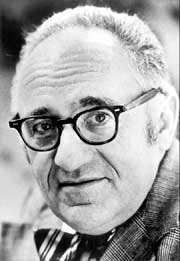
The vital command posts invariably owned monopolistically by the State are: (1) police and military protection; (2) judicial protection; (3) monopoly of the mint (and monopoly of defining money); (4) rivers and coastal seas; (5) urban streets and highways, and land generally (unused land, in addition to the power of eminent domain); and (6) the post office. The defense function is the one reserved most jealously by the State. It is vital to the State's existence, for on its monopoly of force depends its ability to exact taxes from the citizens. If citizens were permitted privately owned courts and armies, then they would possess the means to defend themselves against invasive acts by the government as well as by private individuals.
- Murray N. Rothbard, The Myth of Efficient Government Service
With the State - biggest, baddest exploiter of all time - out of the picture, exploitation, in terms of aggression, would all but vanish. It would be a voluntary society, an anarchy.
Some say that property and capitalism is automatically exploitative, because it allows profit and/or private property. We'll answer this claim in the section below called What are the myths of socialism?.
6. What justifications are there for anarcho-capitalism?
The most general justification was given above in part 2: no man should be ruled by another man. Individual sovereignty, moral autonomy, dignity, soul, whatever you wish to call it, demands that a person refuse to be ruled.
What about the "capitalist" part? There are several justifications given by various anarcho-capitalists
Moral justifications:
- The life of man qua man, man as a rational being, morally necessitates a laissez-faire economic system. (Ayn Rand and objectivists)
- Man must be free and uncoerced so that the man, especially his moral faculty, is allowed to evolve. (Herbert Spencer)
- There is an overriding moral principle in civilized society: that no one should violate the (general moral) rights of others, i.e. initiate force or threat of force. This is called the NAP - Non-Aggression Principle. (Spencer, Rand, Rothbard)
- Capitalism is contractual; it is what rational people implicitly agree to do when they enter society. (Narveson, cf: Contractarian FAQ)
- Libertarianism capitalism is simply what society will do more or less in many or most places in the absense of a State. (David Friedman) This is a a consequentialist or "value-free" economic approach.
- One cannot argue against anarcho-capitalism without implicitly agreeing to its basic assumptions. (Hans-Hermann Hoppe's argumention ethic.)
7. Are anarcho-capitalists anti-war?
If you take war to be violent conflicts between States, then anarcho-capitalists are ardently anti-war. Anarcho-capitalists do not see global politics with the conventional statist paradigm - as a collection of competing States, with every man on a State team. Anarcho-capitalists understand that rulers and subjects have very different interests. The rulers stand to gain power, prestige and popularity from war, whereas the subjects pay the costs, in lives and in money, and in standard of living and quality of life. Wars should be thought of as disputes between petulant power-maddened politicians.
Thus rulers get the benefits of militarism, but shove the costs on others. They also seize upon war as an opportunity to ramp up power. Finally, they use the war as a propaganda tool to gain support for their rule.
Since the land area of the globe has been parceled out among particular States, one of the basic doctrines of the State was to identify itself with the territory it governed. Since most men tend to love their homeland, the identification of that land and its people with the State was a means of making natural patriotism work to the State's advantage. If "Ruritania" was being attacked by "Walldavia," the first task of the State and its intellectuals was to convince the people of Ruritania that the attack was really upon them and not simply upon the ruling caste. - Murray N. Rothbard, The Anatomy of the State
So far we've discussed traditional State on State wars. What about non-traditional wars, such as the "war" on terrorism? Anarcho-capitalists don't see the "war on terrorism" to be a bone fide war. Terrorism is criminal activity, and should be treated as such. It is justified to arrest the actual perpetrators of terrorism, but it is wrong to violate non-combatants. Terrorist acts should be handled as a criminal justice matter using peace officers, not as an inter-State war, with bombings and invasions and civilian casualties.
Most anarcho-capitalists believe that the modern State, by the very nature of way it fights wars, cannot possibly engage in a just war. Modern weaponry makes it impossible for a State to wage war without murdering innocent people. An obvious crime like the "9/11" attack is framed, not as a multiple homicide requiring police investigation, but as an act of war mandating military violence. And the flaghumping public bought it. The anti-war.com website is edited and managed by anarcho-capitalist peacemongers.
8. What are the myths of statism?
The paradigm of statism divides the world into competing States, and men into subjects of those States. The State generally succeeds in buying the services of "court intellectuals" to convince the people that wise leadership is necessary, for their own good, inevitable, and at any rate better than any alternative. Here are some common myths:
- We are the government.
This is perhaps the most insidious myth - a form of extreme victimhood. This Stateholm syndrome is a virulent form of Stockholm syndrome. This identification with the ruler is ubiquitous in statist societies. A person who's never been near a military jet might say, "we bombed Iraq" or "we are fighting to bring democracy." In fact, the ruling elite are making the decisions, and their milfare minions are doing the killing. It is very important to avoid using the slave we in speech, as it impairs critical thinking. Beware the ambiguous collective. It may takes practice to be instantly able to translate "Support our troops" to "support the ruler's hired goons." - The government acts for the common good.
There are problems with this vulgar utilitarian view. What is the common good? (No one agrees.) If we somehow knew the common good, how do we implement it? (No one knows.) Even if we implemented a plan, how do we know it would have the desired results? (We don't, and coercively imposed social planning often has substantial perverse consequences.) There are also institutional objections to the myth. Why would the State act for the common good rather than the interests of the rulers. The rulers make the decisions, and have incentives like all men. Public choice theory is a more reliable preditor of political behavior than naive faith in Pollyanna pluralism. - Government is the only way to solve problem X.
This is the fallacy of government solipotence - the erroneous belief that only the State can solve society's problems. In fact, every valid service that governments now perform can be done more morally, and usually better, by voluntary means. Virtually every current government service has been done, at some time in history, by voluntary means. Private roads, private courts, police, and legal systems, cheap private health insurance, mail delivery, quality control certification, wildlife preservation, and so on have all been done privately. - State and society are are the same, or at least closely allied.
Similar to myth #1, this is an attempt to obscure the important difference between society and State. Society is the sum total of all voluntary human interactions; the State is the institution of monopoly force and legal plunder. They are mortal enemies. The more power government gets, the less power society has. The struggle between liberty and authority is a zero-sum game.
9. What are the myths of socialism?
- The just price doctrine and cost-price theories of value.
The medieval notion of just price permeates socialist thought. It holds that there is a God-given or intrinsic price of a good, regardless of people's wants, needs, and desires, or supply and demand. In the industrial-era form of this doctrine, the value of a good is deemed to be equal to the cost of production, usually in terms of labor time expended (see labor theory of value below). This cost-price notion was refuted in the 1800s by the marginalist revolution in economics, but nevertheless many socialists remain mired in this creationism of the left. The marginalist economists, notably the Austrian School, consider value to be subjective. It depends on each person and his or her particular situation and values. In the desert, one may prefer a cup of water to a diamond. - The labor theory of value.
The labor theory of value (LTV) is the cost-price doctrine which holds that all value springs from labor. In other words, it purports that land, capital, and entrepreneurship are all non-productive, and can impute no value to a good (except insofar as they represent past labor.) The general invalidity of all just price doctrines has already noted. The modern (marginalist) thought is that value is not determined by cost at all, but by the subjective preferences of the buyers interacting with the available quantity of the good in question. This is known as the subjective theory of value. Even on it's own intrinsic price terms, the LTV fails to account for factors of production other than labor. Standard counter-examples abound, e.g. No matter how much time you spend producing mud-pies, they are still worthless; A fresh bottle of wine gains value simply by aging; and so on. It is possible to formulate a purely descriptive LTV, which uses labor time as the measure of the productivity of land and capital, as Kevin Carson does in part 1 of his book Studies in Mutualist Political Economy, however the usefulness of this is dubious, and the temptation to slide into the prescriptive interpretation is enormous, as Carson does without justification in part 2 of the same book. - The exploitation theory.
An ''exploitation theory'' is any theory which purports to justify the claim that one "class" exploits another. In socialist theory, the claim is that a capitalist class exploits a proletarian class. Most exploitation theories are based on the antiquated LTV notion described above. Other socialists realize the weakness of this argument, and base their exploitation theory on unequal negotiating positions. While this latter approach may explain outcomes of bargaining, it evades the relevant issue - whether the trade was voluntary. Thus this approach also fails to support the claim that (so-called) "exploitation" is undesirable or unethical.Note that even stipulating the "creationist" LTV, the socialist argument is insufficient for proving exploitation. It lacks an explanation of why workers voluntarily exchanging labor time for wages is exploitative. Bohm-Bawerk of the Austrian school of economics showed long ago (1884 in "Exploitation Theories") that profit from wages could be explained by interest on advanced pay, i.e. workers getting paid prior to their produce being sold.
- Denial of scarcity (property, money).
This is a favorite of utopian socialists. The purpose of property is to solve the scarcity problem - that man's desires exceed available goods. This myth simply assumes away scarcity, as if this human condition was merely an effect of a particular property system rather than a fact of reality and human nature. The socialist denial of the validity of property involves an internal contradiction and much resulting "double-think." E.g. Proudhon writes that he's against contract property, but for possession property; yet he refuses to acknowledge that his "possession" is a type of property.Another naive denial of scarcity is the claim of some socialists that a modern society can get along without money. Hayek made a living by refuting that view: in short, an economy needs the informational function of money to balance supply and demand. Without the amalgamation of the desires and preferences of the producers and consumers into price, chaos results. Shortages and surpluses abound when the communication of preferences is prevented or co-opted by rulers. Money is simply and ultimately the most liquid commodity in a market. There will always be a most liquid commodity in any market; ergo, there will be something used as money.
- Human nature can be changed by social engineering.
Many statist socialists have plans and programs to transform society into their vision of community and the good life. Unfortunately, the nature of man is not infinitely elastic. These socialists tend to overestimate their ability to "mold the clay" of mankind, and underestimate his natural proclivities and the evolutionary nature any major advance in his moral faculties. In fact, as quasi-anarcho-capitalist Herbert Spencer pointed out, many of the statist schemes are counter-productive to human progress, and have results perverse even by the social engineers' standards.
Francois Tremblay, a market anarchist who considers himself a socialist and believes in the labor theory of value, has a rebuttal to this section here. I reply to his rebuttal here.
10. Why don't you just leave?
One could simply turn this around, and ask, "Why doesn't the State just leave?" The "love it or leave it" bromide begs the underlying question: Who is entitled to occupy this space? Perhaps a hardcore statist would simply assume that the government rightfully owns everything, but anarcho-capitalists reject that assumption, given the State's history of conquest and plunder. We believe rightful property comes from homesteading and voluntary exchange, not conquest. A good anarcho-capitalist response may be, "The State doesn't rightfully own this property; people do."
11. Are there different types of anarcho-capitalism?
Yes, but the differences are sometimes rather academic. One division concerns the justification of libertarianism. There is an ongoing discussion between natural rights theorists like Rothbard, and consequentialists like David Friedman. A parallel discussion pits natural righters against contractarians like Jan Narveson. These were discussed above in the moral justifications section.
Other divisions concern strategy in bringing about a libertarian society. There are a few parliamentarians among anarchists, but most take the Voluntaryist position and refuse to vote or participate in electoral politics. Lysander Spooner argued that voting could be a valid form of self-defense against the predations of the State. Rothbard was a parliamentarian, always involved in political coalitions and electoral politics; George H. Smith and Wendy McElroy are strongly opposed to feeding the beast. (See The Ethics of Voting by George H. Smith and Why I Would Not Vote Against Hitler by Wendy McElroy.)

Agorists believe that counter-economics (using black and gray markets, i.e. the underground untaxed economy) is the path to a free society. Samual E. Konkin III founded this "libertarian left" philosophy. His pamphlet The New Libertarian Manifesto is the classic presentation of this anti-establishment framing of anarcho-capitalism.
Some anarcho-capitalists have actually shunned the term "capitalism" and describe themselves as "left libertarian" free market anti-capitalists! Why? They choose to use the 19th century Marxian definition of capitalism - the exploitative collusion of (certain established) capitalists and State. (Most anarcho-capitalists would call this "economic fascism" or "statist capitalism.") This approach is basically a marketing ploy; branding anarcho-capitalism in a way that may attract anti-privilege lefties who use such jargon. These "left libertarians" tend to stress anti-corporation and equality issues, as their lefty jargon would imply. Some may even call themselves "socialist," again appealing to 19th century terminology. Brad Spangler suggests, perhaps tongue in cheek, using the term "stigmergic socialism."
A high-profile division among anarcho-capitalists concerns what things can be valid property. In particular, the validity of intellectual property (IP) is hotly contested, with one camp per Benjamin Tucker denying that non-scarce goods qualify as property, and the other per Lysander Spooner strongly supporting copyrights and patents. Agorism, mentioned above, is anti-IP. Another property question is whether land and natural resources are valid private property. While most anarcho-capitalists consider land to be valid property, geoanarchists disagree. Geoanarchism is the radical branch of geoism (aka Georgism), which interprets the Georgist "single tax" ground rent as either a "citizen's dividend" to be disbursed to everyone in the community, or as the income to a community-owned firm providing municipal services.
Finally, there are varying speculations on what a stateless society would look like. Will PDAs (Private Defense Agencies) be vertically integrated, or would there be separate police, court, and penal firms? Will there be non-territorial provision of defense, or will it be provided in territorial enclaves, such as neighborhoods, wards, and quasi-city-States? Will most public services and land be owned by individuals and households, or be leased like apartments or Home Owners Association or intentional communities. The freehold versus leasehold issue pits the mainstream freehold-based vision against Heathian anarchism (after Georgist dissenter Spencer Heath) which favors leasehold arrangements.
12. How do anarcho-capitalists compare with other anarchists?
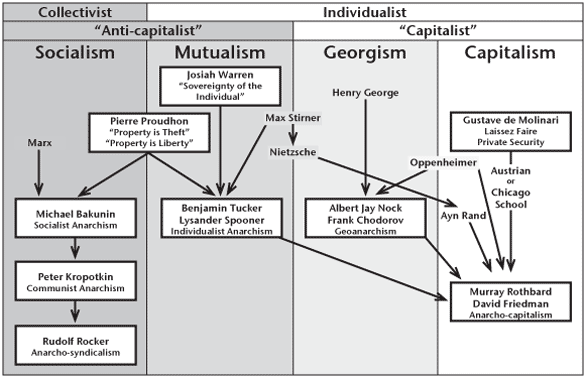
The main distinction between anarcho-capitalists and other anarchists is the support of capitalism. Other anarchists have problems with either private neo-Lockean property, profiting from other people's labor, or both. The 19th century individualist anarchists were mutualists. They opposed "usury" - profit from land or capital or wage-labor. "Cost is the limit of price" was their motto, summing up their interpretation of the LTV. Anarcho-socialists not only oppose profit, but also oppose private ownership of capital ("the means of production" in socialist-speak.) Of the four basic economic divisions of anarchism, collectivists are anti-capitalist, mutualists are middle-of-the-road, while geoanarchists and anarcho-capitalists are pro-capitalist.
13. Is anarcho-capitalism the same thing as libertarianism?
No, but it's close. Just as anarcho-capitalism is a subtype of anarchism, it is also a subtype of libertarianism. Libertarianism is the belief that liberty is the primary political virtue, or (in a relative sense) that government wields too much power. For most Americans, it is conjoined with the belief in capitalism. But libertarians don't necessarily deny the legitimacy of the State as an institution - most believe that a minimal State is necessary to provide defense services. This minimal State, sometimes called "the nightwatchman State," is a government that provides only three things: police, courts, and defense against foreign invasion. This means that no government redistribution of wealth or regulation of the market is allowed. Anarcho-capitalists, therefore, hold the same values as minarchist libertarians, but take it to the logical conclusion: even a minimal State is too authoritarian. If government monopoly is bad for all other services, how can it suddenly be okay for the provision of defense? In short, an anarcho-capitalist is a radical libertarian. He rejects minarchism for anarchism.
14. Who are the major anarcho-capitalist thinkers?
The first known anarcho-capitalist is Gustave de Molinari, who wrote the seminal piece, The Production of Security, in 1849. But the term "anarcho-capitalist" had not been invented yet. The "father of anarcho-capitalism" is Murray Rothbard, who combined the individualist anarchism of Lysander Spooner, the economics of the Austrian School, and the anti-interventionism of the Old Right, to create the modern meme of anarcho-capitalism. Not that he did it alone! Other prominent anarcho-capitalists are David Friedman, Walter Block, Wendy McElroy, Hans-Hermann Hoppe, Brian Caplan, Jan Narveson, Anthony de Jasay, George H. Smith, Wolf DeVoon, Jeremy Sapienza, Lew Rockwell, Rose Larken, Michael Huemer, Stefan Molyneux, and others too numerous to mention. Note that not all of these refer to themselves as "anarcho-capitalist." Wendy McElroy calls herself and individualist anarchist, while Lew Rockwell, who edits the most popular anarcho-capitalist ezine LewRockwell.com, sometimes calls himself a paleoconservative, even though he wrote a book called Against the State: An Anarcho-Capitalist Manifesto.

15. How would anarcho-capitalism work?
In one sense, this is easy to answer. Since most people are familiar with capitalism, one could simply say, "Just like today's semi-capitalist societies, except with no coercive monopolies." As already noted, most services currently provided by State have been done voluntarily in the past, usually with better quality and service than the State. This is what you'd expect, since monopolies lack the usual competitive incentives to improve. The services that people have not already seen provided privately, such as court, police, and defense against military invasion, require more explanation.
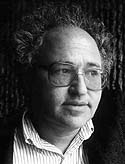
Imagine a society with no government. Individuals purchase law enforcement from private firms. Each such firm faces possible conflicts with other firms. Private policemen working for the enforcement agency that I employ may track down the burglar who stole my property only to discover, when they try to arrest him, that he too employs an enforcement agency.
There are three ways in which such conflicts might be dealt with. The most obvious and least likely is direct violence-a mini-war between my agency, attempting to arrest the burglar, and his agency attempting to defend him from arrest. A somewhat more plausible scenario is negotiation. Since warfare is expensive, agencies might include in the contracts they offer their customers a provision under which they are not obliged to defend customers against legitimate punishment for their actual crimes. When a conflict occurred, it would then be up to the two agencies to determine whether the accused customer of one would or would not be deemed guilty and turned over to the other.
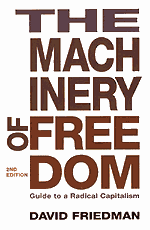
A still more attractive and more likely solution is advance contracting between the agencies. Under this scenario, any two agencies that faced a significant probability of such clashes would agree on an arbitration agency to settle them - a private court. Implicit or explicit in their agreement would be the legal rules under which such disputes were to be settled.
Under these circumstances, both law enforcement and law are private goods produced on a private market. Law enforcement is produced by enforcement agencies and sold directly to their customers. Law is produced by arbitration agencies and sold to the enforcement agencies, who resell it to their customers as one characteristic of the bundle of services they provide.
– David Friedman, Law as a Private GoodThere are several obvious advantages to private law.
- You are likely to be treated better by a PDA than a monopoly government agency, since you are a customer (or at least a potential customer) rather than a suspect.
- Victimless "crime" laws are significantly less likely, since customers would bear the cost of enforcing laws against vices rather than passing the cost on to society at large. (E.g. Someone opposed to marijuana is likely to vote against legalization, but less likely to pay $100/year to make it illegal.)
- But most importantly, everyone gets their own preferred law, rather than having to submit to winner-take-all imposed law. E.g. A religious puritan may subscribe to a PDA under a plan in which adulterers (who subscribe to this plan) would be stoned to death. His next-door neighbor may subscribe to a service that allows open copulation in the front yard. Both can have their way, since jurisdictions are simply the combined properties of the subscribers.
Non-government military provision is more familiar to most people, under the guise of ''militia''. A militia is a voluntary defense service which is unlikely to invade a foreign country, build weapons of mass destruction and death, fund itself with stolen money, or most other questionable actions in which government militaries routinely engage. A militia is geared to do one thing: defend the local people. Anarcho-capitalists also see a role for defense firms and mercenaries, to take care of security issues not so localized. Note that, since the costs of warfare are borne by those firms who engage in it, they are considerably more likely to sue for peace than a State, which is able to shove costs onto their plundered and conscripted citizenry.
16. How would anarcho-capitalists handle the "public goods" problem?
Many anarcho-capitalists deny there is a need to "handle" such problems at all. The implicit assumption in the question is that a) freeloading, or b) services which cannot get funding voluntarily due to individual rationality issues, somehow justify the use of aggression. Those who support the NAP deny this assumption.
Another approach is to point out that, in these cases, the State does not really solve the public goods problem. It merely creates a bigger, more intractable public goods problem - how to limit State power. As Friedman points out, in a statist society good law is a public good and bad "special interest" law is a private good. So the result is that good law is undersupplied and bad law is oversupplied. By shifting the problem to State authority, you simply contribute to the hell that Bastiat warned us about, where "everybody plunders everybody." [The Law]
17. Have there been any anarcho-capitalist societies?
Yes, more or less. Since both anarchism and capitalism are theoretical models, it's hard to claim that any real situation is 100% stateless and 100% free market capitalist. But there are various societies that were, for all intents and purposes, stateless, and societies that implemented anarcho-capitalist "programs" such as private law. Here is a short list:
- Harappa (3000 BC - 1500 BC)
The Harappan culture of Bronze Age India had large cities and covered large areas. All infrastructure was apparently paid for by merchants, including roads, city walls, and plumbing. The lack of tombs, mounds, or pyramids make archeologists believe that this was a stateless society that lasted over a millennium.
Cf: Thomas J. Thompson, Ancient Stateless Civilization: Bronze Age India & the State in History. - Celtic Ireland (650 - 1650)
In Celtic Irish society, the courts and the law were largely libertarian, and operated within a purely state-less manner. This society persisted in this libertarian path for roughly a thousand years until its brutal conquest by England in the seventeenth century. And, in contrast to many similarly functioning primitive tribes (such as the Ibos in West Africa, and many European tribes), preconquest Ireland was not in any sense a "primitive" society: it was a highly complex society that was, for centuries, the most advanced, most scholarly, and most civilized in all of Western Europe. A leading authority on ancient Irish law wrote, "There was no legislature, no bailiffs, no police, no public enforcement of justice... There was no trace of State-administered justice." - Icelandic Commonwealth (930 - 1262)
David Friedman has studied the legal system of this culture, and observes:The legal and political institutions of Iceland from the tenth to the thirteenth centuries ... are of interest for two reasons. First, they are relatively well documented; the sagas were written by people who had lived under that set of institutions and provide a detailed inside view of their workings. Legal conflicts were of great interest to the medieval Icelanders: Njal, the eponymous hero of the most famous of the sagas, is not a warrior but a lawyer--"so skilled in law that no one was considered his equal." In the action of the sagas, law cases play as central a role as battles.
Second, medieval Icelandic institutions have several peculiar and interesting characteristics; they might almost have been invented by a mad economist to test the lengths to which market systems could supplant government in its most fundamental functions. Killing was a civil offense resulting in a fine paid to the survivors of the victim. Laws were made by a "parliament," seats in which were a marketable commodity. Enforcement of law was entirely a private affair. And yet these extraordinary institutions survived for over three hundred years, and the society in which they survived appears to have been in many ways an attractive one . Its citizens were, by medieval standards, free; differences in status based on rank or sex were relatively small; and its literary, output in relation to its size has been compared, with some justice, to that of Athens.
- David Friedman, Private Creation and Enforcement of Law: A Historical Case - Cospaia (1440 - 1826)
Cospaia was the longest-lived and most capitalist Western anarchist society to ever exist. It had no taxes and no legislative body. It prospered due to drug prohibition (of tobacco). It came into existence by accident, more or less, rather than revolution. "Cospaia was so peaceful, so small, and provided so many resources to her neighbors that no one ever bothered to invade or attack."
- The Republic of Cospaia: An Anarchist Renaissance City - Rhode Island (1636 - 1648)
Religious dissenter Roger Williams, after being run out of theocratic puritan Massachusetts Bay Colony in 1636, founded Providence, Rhode Island. Unlike the brutal Puritans, he scrupulously purchased land from local indians for his settlement. In political beliefs, Williams was close to the Levellers of England. He describes Rhode Island local "government" as follows: "The masters of families have ordinarily met once a fortnight and consulted about our common peace, watch and plenty; and mutual consent have finished all matters of speed and pace." While Roger Williams was not explicitly anarchist, another Rhode Islander was: Anne Hutchinson. Anne and her followers emigrated to Rhode Island in 1638. They bought Aquidneck Island from the Indians, and founded the town of Pocasset (now Portsmouth.) Another "Rogue Island" libertarian was Samuell Gorton. He and his followers were accused of being "anarchists." Governor Winthrop of Massachusetts Bay called Gorton a "man not fit to live upon the face of the earth." Gorton and his followers were forced in late 1642 to found an entirely new settlement of their own: Shawomet (later Warwick). In the words of Gorton, for over five years the settlement "lived peaceably together, desiring and endeavoring to do wrong to no man, neither English nor Indian, ending all our differences in a neighborly and loving way of arbitration, mutually chosen amongst us."
- Rothbard, The Origins of Individualist Anarchism in America - Albemarle (1640's - 1663)
The coastal area north of Albemarle Sound in what is now northeastern North Carolina had a quasi-anarchistic society in the mid-17th century. Officially a part of the Virginia colony, in fact it was independent. It was a haven for political and religious refugees, such as Quakers and dissident Presbyterians. The libertarian society ended in 1663, when the King of England granted Carolina to eight feudal proprietors backed by military.
- Rothbard, The Origins of Individualist Anarchism in America - Holy Experiment (Quaker) Pennsylvania (1681 - 1690)
When William Penn left his Quaker colony in Pennsylvania, the people stopped paying quitrent, and any semblance of formal government evaporated. The Quakers treated Indians with respect, bought land from them voluntarily, and had even representation of Indians and Whites on juries. According to Voltaire, the Shackamaxon treaty was "the only treaty between Indians and Christians that was never sworn to and that was never broken." The Quakers refused to provide any assistance to New England's Indian wars. Penn's attempt to impose government by appointing John Blackwell, a non-Quaker military man, as governor failed miserably.
- Rothbard, Pennsylvania's Anarchist Experiment: 1681-1690 - The American "Not so Wild" West - various locations
Most law for settlements in the American West was established long before US government agents arrived. Property law was generally defined by local custom and/or agreement among the settlers. Mining associations established orderly mining claims, cattlemen's associations handled property rights on the plains, local "regulators" and private citizens provided enforcement. Yet most movie-watching people are surprised to learn that crime rates were lower in the West than the "civilized" East.
Cf: The American Experiment in Anarcho-Capitalism: The Not so Wild, Wild, West - Laissez Faire City
A more recent unsuccessful attempt to start a new country, LFC attempted to lease a hundred square miles of land from a third-world State in order to start an anarcho-capitalist society, taking Hong Kong as a guide. When that fell through, some members moved to Costa Rica, where the State is relatively weak, there is no standing army, and what little State interference there can usually be "bought off." There remain small libertarian communities in the central valley (Curridabat) and on the Pacific coast (Nosara).
18. How might an anarcho-capitalist society be achieved?
There is no consensus among anarcho-capitalists how a free society might be achieved. Everyone agrees that educating other people is useful. Beyond that, there are many strategies. There are Gulchers (named after the fictional "Galt's Gulch" in Ayn Rand's book "Atlas Shrugged") such as the Laissez Faire City bunch, who see little or no chance in changing an entrenched welfare-warfare State. These "retreatists" propose to set up isolated communities away from statist authority.PTs (permanent tourists, perpetual travelers, prior tax-payers) try to maintain tourist status in all States they traverse, paying no taxes and keeping wealth effectively beyond the reach of grasping States. A sophisticated PT uses the "four flag" strategy: he'll use a passport from a different State than the one which claims him as subject, keep his wealth in a third State, and, when not traveling, reside in a fourth State.

Very few anarcho-capitalists are active in electoral politics, since this is basically begging one's master. Most anarcho-capitalists choose to "tend their own garden," by setting up voluntary alternatives to State agencies and functions. Home schooling, for example, is strongly advocated, as are neighborhood mediation associations, and participation in organizations such as Habitat for Humanity.
Many anarcho-capitalists use alternative currencies, silver rounds, and especially anonymous cryptocurrencies such as BitCoin, Stellar, and Ethereum. This could defeat the money monopoly, reversing the government capture of money and banking. Now everyone can be his own banker and transact anonymously. This is an agorist dream come true!
The stakes are high for both Liberty and Power. Bitcoin offers individuals a chance to privatize their own wealth, which amounts to nothing less than privatizing their own lives. In doing so, Bitcoin announces to governments and financial institutions that they could lose their monopoly on wealth, without which they are impotent.
- Wendy McElroy, The Satoshi Revolution
More info: Market Money, Fiat Money, & Cryptocurrency
Virtually all anarcho-capitalists see the transition to a free society to be evolutionary rather than revolutionary. Some see little to do about proximate politics, and simply wait for the inevitable decline of statism while trying to "stay beneath the radar" of government. Anarcho-capitalists are, of course, ardent supporters of tax resistence. Many strive to support "counter-economic" activity, i.e. the illegal ("black") market, which they see as the only truly free market. (Agorism.) Many achieve an "off the books" income where no tribute is paid to the State. Thus, information about guerrilla capitalism, such as not leaving paper trails, not using tracable money, private mail drops, anonymous bank accounts and debit cards, etc. are of vital interest to these anarcho-capitalists.
19. What is the anarcho-capitalist theory of property?
Anarcho-capitalists define property as a socially recognized relationship between a person (or group) regarding the use of a scarce entity. Most anarcho-capitalists believe that the purpose of property is to solve the scarcity problem peacefully, plunder being an undesirable alternative. Thus, non-scarce (non-rivalrous) things (such as information or recipes or theorems or copyrights or patents) are not legitimate property.
Private property is characterized by private jurisdiction, with original acquisition by homesteading, and no restrictions on who may own things. (There are no caste restrictions such as 'only current workers may own capital' that communists favor.) There are two types of private property:
- sticky property - private property with ownership lasting (more or less) until consensual transfer.
- possession property (aka usufruct) - private property with ownership lasting (more or less) only while continuous use or occupation is maintained.
Anarcho-capitalists favor sticky property, while market anarchists and mutualist anarchists (who identify as socialist) favor possession property. Despite their Marxian jargon, those “socialists” are almost closet anarcho-capitalists.
The anarcho-capitalist theory of property is based on classical liberal thought, particularly John Locke. Robert Nozick called it the Entitlement Theory of Distributive Justice. Also see: Property Theory slide show.
20. Where can I get more information about anarcho-capitalism?
Books •
Web Sites •
Videos •
Posters
Memes •
Symbols •
Flags •
Songs
21. Do you have any tips on how to talk to people about anarcho-capitalism?
Make your definitions clear up front, so you don't get bogged down in semantics. Here are some disputed terms with lists of definitions:
Anarchism • Government • Liberty • Libertarianism • Capitalism • Socialism • Democracy • Aggression
Be familiar with logical fallacies, especially the barefoot fallacy (fallacy of government solipotence) and the Nirvana fallacy which come up a lot when discussing anarchism. Try to use philosophical charity - interpret your opponent's argument with the best possible interpretation. Avoid slurs and psychologizing, obviously. Good luck!

